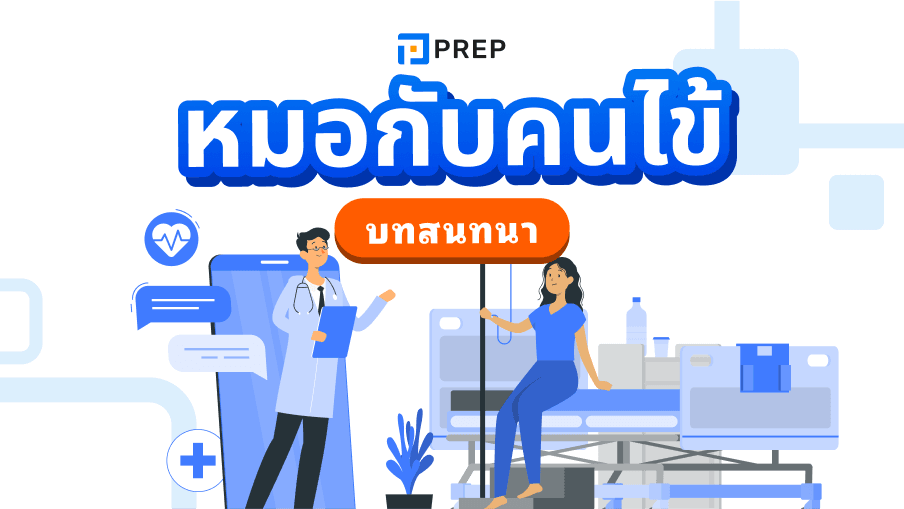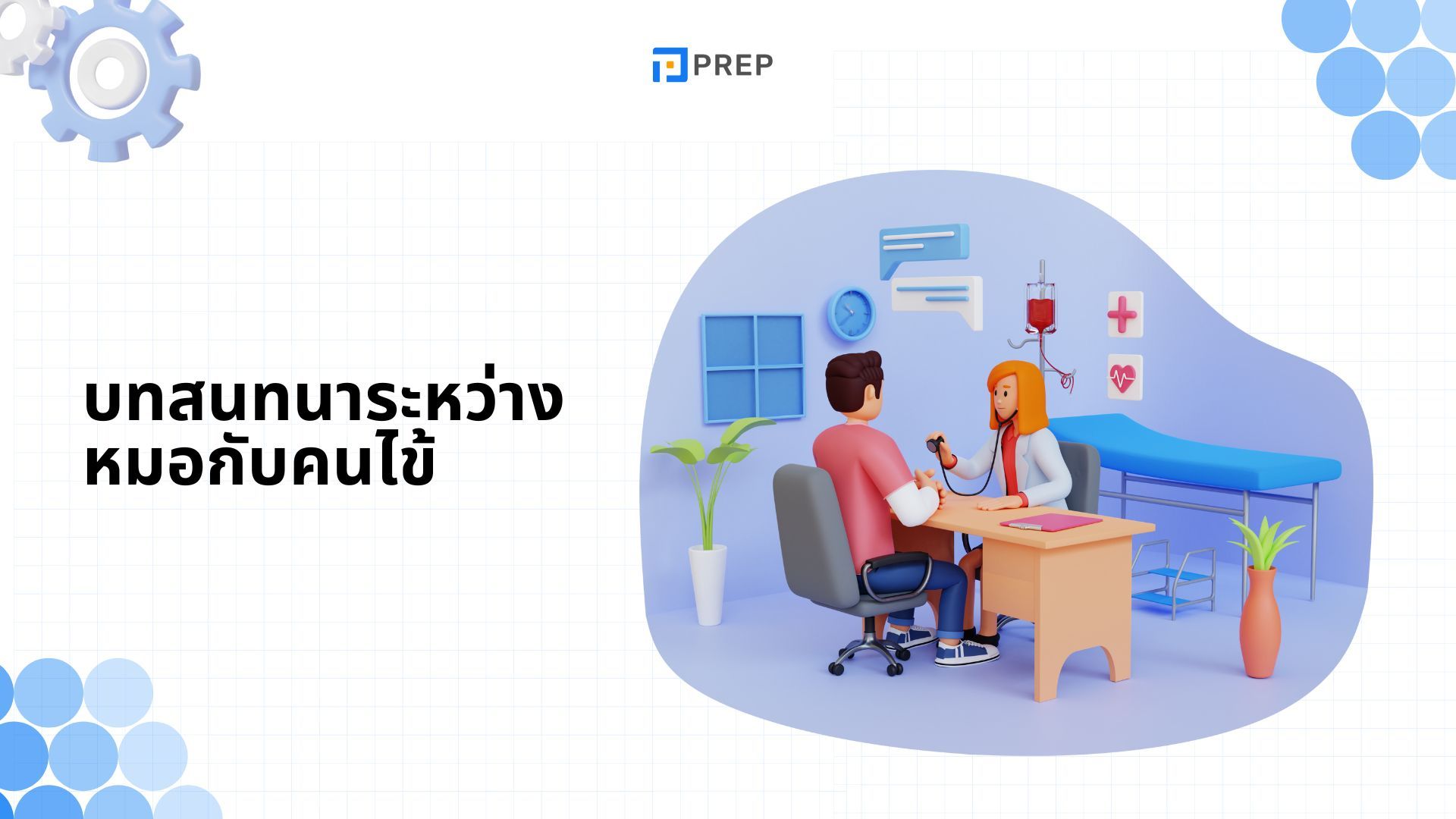บทสนทนาระหว่างหมอกับคนไข้ ตัวอย่างคำพูดที่ใช้บ่อย
การสื่อสารระหว่างแพทย์และผู้ป่วยเป็นทักษะสำคัญที่ทุกคนควรมี โดยเฉพาะเมื่อต้องเดินทางไปต่างประเทศหรือใช้บริการทางการแพทย์ในสถานการณ์ที่ต้องใช้ภาษาอังกฤษ การเรียนรู้บทสนทนาระหว่างหมอกับคนไข้จะช่วยให้คุณสามารถอธิบายอาการ ตอบคำถามของแพทย์ และเข้าใจคำแนะนำทางการแพทย์ได้อย่างถูกต้องและมั่นใจ
การเข้าพบแพทย์ในโรงพยาบาลหรือคลินิกต่างประเทศอาจทำให้รู้สึกกังวล โดยเฉพาะเมื่อต้องใช้ภาษาอังกฤษในการสนทนา การเตรียมตัวล่วงหน้าด้วยการศึกษาบทสนทนาในโรงพยาบาลและคำศัพท์ที่เกี่ยวข้องจะช่วยลดความเครียดและทำให้คุณสามารถสื่อสารกับบุคลากรทางการแพทย์ได้อย่างมีประสิทธิภาพ ไม่ว่าจะเป็นการนัดหมาย การอธิบายอาการ หรือการรับฟังคำวินิจฉัยและคำแนะนำในการรักษา
Conversation between doctor and patient เป็นหัวข้อที่สำคัญในการเรียนภาษาอังกฤษเพื่อการสื่อสาร โดยเฉพาะสำหรับผู้ที่เตรียมตัวสอบ IELTS ซึ่งอาจพบหัวข้อเกี่ยวกับสุขภาพและการแพทย์ในส่วน Speaking หรือ Writing นอกจากนี้ การรู้วิธีสนทนาภาษาอังกฤษในบริบททางการแพทย์ยังเป็นทักษะที่จำเป็นสำหรับผู้ที่ทำงานในสายอาชีพด้านสุขภาพ นักเรียนแพทย์ พยาบาล หรือผู้ที่วางแผนจะศึกษาต่อหรือทำงานในต่างประเทศ
บทความนี้รวบรวมตัวอย่างบทสนทนาระหว่างหมอกับคนไข้ที่ใช้บ่อยในสถานการณ์ต่างๆ ตั้งแต่การนัดหมาย การซักประวัติ การอธิบายอาการป่วย ภาษาอังกฤษที่ใช้บอกอาการเจ็บป่วย การตรวจร่างกาย การวินิจฉัยโรค การสั่งยา และการให้คำแนะนำในการดูแลสุขภาพ พร้อมคำศัพท์และวลีที่จำเป็นที่จะช่วยให้คุณสื่อสารได้อย่างมั่นใจและมีประสิทธิภาพ มาเริ่มต้นเรียนรู้กันเลย

I. คำศัพท์พื้นฐานที่ใช้ในบทสนทนาระหว่างหมอกับคนไข้
ก่อนที่จะลงลึกในบทบทสนทนาระหว่างหมอกับคนไข้ เรามาสะสมคำศัพท์เกี่ยวกับการตรวจรักษาในภาษาอังกฤษกันก่อน ลองดูด้านล่างเลยกับ PREP Education!

|
คำศัพท์ภาษาอังกฤษเกี่ยวกับการตรวจรักษา |
ความหมาย |
ตัวอย่าง |
|
Diagnosis /daɪəɡˈnoʊsɪs/ |
การวินิจฉัยโรค |
The doctor made a quick diagnosis based on the patient's symptoms. (หมอวินิจฉัยโรคอย่างรวดเร็วตามอาการของคนไข้) |
|
Treatment /ˈtriːtmənt/ |
การรักษา |
Anna underwent a series of treatments to manage her condition. (Anna ผ่านการรักษาหลายครั้งเพื่อจัดการกับอาการของเธอ) |
|
Symptom /ˈsɪmptəm/ |
อาการ |
Fever and cough are common symptoms of the flu. (ไข้และไอเป็นอาการทั่วไปของไข้หวัด) |
|
Prescription /prɪˈskrɪpʃən/ |
ใบสั่งยา |
The doctor wrote a prescription for antibiotics to treat the infection. (หมอเขียนใบสั่งยาปฏิชีวนะเพื่อรักษาการติดเชื้อ) |
|
Medication /ˌmɛdɪˈkeɪʃən/ |
ยา |
Jack takes his medication regularly to control his blood pressure. (Jack ทานยาตามที่กำหนดเพื่อควบคุมความดันโลหิตของเขา) |
|
Specialist /ˈspɛʃəlɪst/ |
ผู้เชี่ยวชาญ |
Marry was referred to a specialist for further evaluation of her condition. (Marry ถูกส่งตัวไปหาผู้เชี่ยวชาญเพื่อประเมินอาการเพิ่มเติม) |
|
Examination /ɪɡˌzæmɪˈneɪʃən/ |
การตรวจร่างกาย |
The doctor performed a thorough examination of the patient's abdomen. (หมอทำการตรวจร่างกายอย่างละเอียดที่ช่องท้องของคนไข้) |
|
Surgery /ˈsɜrdʒəri/ |
การผ่าตัด |
John will undergo surgery to remove the tumor. (John จะเข้ารับการผ่าตัดเพื่อเอาเนื้องอกออก) |
|
Recovery /rɪˈkʌvəri/ |
การฟื้นฟู |
After the surgery, Xavia made a quick recovery and was soon back to her normal activities. (หลังการผ่าตัด Xavia ฟื้นตัวอย่างรวดเร็วและกลับไปทำกิจกรรมตามปกติได้ในไม่ช้า) |
|
Rehabilitation /ˌriːəˌbɪlɪˈteɪʃən/ |
การบำบัด |
The patient will need extensive rehabilitation to regain strength after the accident. (คนไข้จะต้องการการฟื้นฟูสมรรถภาพอย่างกว้างขวางเพื่อฟื้นฟูกำลังหลังจากอุบัติเหตุ) |
|
Anesthesia /ˌænɪsˈθiʒə/ |
การวางยาสลบ |
The anesthesiologist administered anesthesia before the surgery. (วิสัญญีหมอให้ยาสลบก่อนการผ่าตัด) |
|
Infection /ɪnˈfɛkʃən/ |
การติดเชื้อ |
The wound became red and swollen, indicating an infection. (แผลเริ่มแดงและบวม ซึ่งบ่งบอกถึงการติดเชื้อ) |
|
Consultation /ˌkɑːnsəlˈteɪʃən/ |
การปรึกษา |
Richard scheduled a consultation with the doctor to discuss his treatment options. (Richard นัดปรึกษากับหมอเพื่อพูดคุยเกี่ยวกับตัวเลือกการรักษา) |
|
Therapy /ˈθɛrəpi/ |
การบำบัดรักษา |
Physical therapy helped him regain mobility after the injury. (การบำบัดทางกายช่วยให้เขาฟื้นฟูความเคลื่อนไหวหลังจากบาดเจ็บ) |
|
Emergency /ɪˈmɜrdʒənsi/ |
กรณีฉุกเฉิน |
They rushed Peter to the emergency room after he had a severe allergic reaction. (พวกเขารีบพา Peter ไปห้องฉุกเฉินหลังจากที่เขามีอาการแพ้อย่างรุนแรง) |
บทความแนะนำ: คำศัพท์ สุขภาพภาษาอังกฤษที่ควรรู้
II. วลีและประโยคสำคัญในบทสนทนาระหว่างหมอกับคนไข้
1. วลีที่แพทย์ใช้บ่อย
|
วลีภาษาอังกฤษ |
ความหมาย |
|
What seems to be the problem? |
มีอะไรให้ช่วยไหม / เป็นอะไรครับ |
|
How long have you had these symptoms? |
มีอาการมานานแค่ไหนแล้ว |
|
Does it hurt when I press here? |
เจ็บไหมตอนที่กดตรงนี้ |
|
Are you allergic to any medications? |
แพ้ยาอะไรไหม |
|
I'm going to prescribe... |
ผมจะสั่งยา... |
|
Take this medication three times a day |
กินยานี้วันละ 3 ครั้ง |
|
You should rest and drink plenty of fluids |
คุณควรพักผ่อนและดื่มน้ำมากๆ |
|
Come back if your condition worsens |
กลับมาถ้าอาการแย่ลง |
2. วลีที่ผู้ป่วยใช้บ่อย
|
วลีภาษาอังกฤษ |
ความหมาย |
|
I have a terrible headache |
ฉันปวดหัวมาก |
|
I've been feeling dizzy |
ฉันรู้สึกเวียนหัว |
|
I can't sleep at night |
ฉันนอนไม่หลับตอนกลางคืน |
|
The pain is getting worse |
อาการเจ็บปวดแย่ลง |
|
How much should I take? |
ควรกินเท่าไหร่ |
|
When should I come back? |
ควรกลับมาเมื่อไหร่ |
|
Is it contagious? |
มันติดต่อไหม |
|
Will I need surgery? |
จำเป็นต้องผ่าตัดไหม |
III. บทสนทนาระหว่างหมอกับคนไข้ภาษาอังกฤษ
มาสำรวจบทสนทนาระหว่างหมอกับคนไข้ 6 บทที่ PREP ได้รวบรวมมา ลองดูนะ!

II. บทสนทนาระหว่างหมอกับคนไข้
1. การนัดหมายและการลงทะเบียน
ตัวอย่างบทสนทนาที่ 1: การนัดหมายทางโทรศัพท์
Receptionist: Good morning, City Hospital. How may I help you? (สวัสดีตอนเช้า โรงพยาบาลซิตี้ มีอะไรให้ช่วยไหมคะ)
Patient: Good morning. I'd like to make an appointment with Dr. Smith, please. (สวัสดีครับ ผมอยากนัดหมายกับหมอสมิธครับ)
Receptionist: Certainly. What's the purpose of your visit? (ได้เลยค่ะ มีอะไรให้ช่วยคะ / มาเพื่ออะไรคะ)
Patient: I've been having a persistent cough for the past week. (ผมไอมาประมาณสัปดาห์แล้วครับ)
Receptionist: I see. Dr. Smith has an opening on Wednesday at 2 PM. Does that work for you? (เข้าใจค่ะ หมอสมิธมีช่องว่างวันพุธเวลา 2 โมงเย็น สะดวกไหมคะ)
Patient: Yes, that's perfect. Thank you. (ได้ครับ สะดวกดีเลยครับ ขอบคุณครับ)
Receptionist: May I have your name and phone number, please? (ขอทราบชื่อและเบอร์โทรศัพท์ด้วยค่ะ)
Patient: My name is John Anderson, and my phone number is 555-1234. (ผมชื่อจอห์น แอนเดอร์สัน เบอร์โทรศัพท์ 555-1234 ครับ)
ตัวอย่างบทสนทนาที่ 2: การลงทะเบียนที่โรงพยาบาล
Receptionist: Good afternoon. Are you here for an appointment? (สวัสดีตอนบ่ายค่ะ มานัดหมายไว้หรือเปล่าคะ)
Patient: Yes, I have an appointment with Dr. Johnson at 3 o'clock. (ครับ ผมนัดหมายกับหมอจอห์นสันเวลา 3 โมงครับ)
Receptionist: May I see your ID and insurance card, please? (ขอดูบัตรประชาชนและบัตรประกันด้วยค่ะ)
Patient: Here you are. (นี่ครับ)
Receptionist: Thank you. Is this your first visit to our hospital? (ขอบคุณค่ะ นี่เป็นครั้งแรกที่มาโรงพยาบาลเราใช่ไหมคะ)
Patient: Yes, it is. (ใช่ครับ)
Receptionist: Please fill out this medical history form and have a seat in the waiting room. The nurse will call you shortly. (กรุณากรอกแบบฟอร์มประวัติการรักษาและนั่งรอในห้องรอค่ะ พยาบาลจะเรียกคุณในไม่ช้า)
2. การซักประวัติและอธิบายอาการ
ตัวอย่างบทสนทนาที่ 3: การซักประวัติผู้ป่วย
Doctor: Good afternoon, Mr. Anderson. I'm Dr. Smith. What brings you in today? (สวัสดีตอนบ่ายครับ คุณแอนเดอร์สัน ผมหมอสมิธครับ วันนี้มีอะไรให้ช่วยครับ)
Patient: Hello, Doctor. I've been having a bad cough for about a week now. (สวัสดีครับหมอ ผมไอมาประมาณสัปดาห์แล้วครับ)
Doctor: I see. Do you have any other symptoms? Fever, headache, or body aches? (เข้าใจครับ มีอาการอื่นไหมครับ เช่น ไข้ ปวดหัว หรือปวดเมื่อยตามตัว)
Patient: Yes, I've had a mild fever and feel very tired. (มีครับ มีไข้เล็กน้อยและรู้สึกเหนื่อยมากครับ)
Doctor: Are you taking any medications currently? (ตอนนี้กินยาอะไรอยู่ไหมครับ)
Patient: No, I'm not taking anything. (ไม่ครับ ไม่ได้กินยาอะไรเลย)
Doctor: Do you have any allergies to medications? (แพ้ยาอะไรไหมครับ)
Patient: I'm allergic to penicillin. (แพ้เพนิซิลลินครับ)
Doctor: Thank you for letting me know. Do you smoke or drink alcohol? (ขอบคุณที่บอกครับ สูบบุหรี่หรือดื่มแอลกอฮอล์ไหมครับ)
Patient: I don't smoke, but I drink occasionally. (ไม่สูบบุหรี่ครับ แต่ดื่มเป็นบางครั้งครับ)
ตัวอย่างบทสนทนาที่ 4: การอธิบายอาการป่วยอย่างละเอียด
Doctor: Can you describe your cough? Is it dry or productive? (ช่วยอธิบายอาการไอหน่อยได้ไหมครับ ไอแห้งหรือมีเสมหะครับ)
Patient: It's a productive cough. I'm coughing up yellow mucus. (เป็นไอที่มีเสมหะครับ มีเสมหะสีเหลืองออกมาครับ)
Doctor: When did the symptoms start? (อาการเริ่มเมื่อไหร่ครับ)
Patient: About a week ago. It started with a sore throat, then the cough developed. (ประมาณสัปดาห์ที่แล้วครับ เริ่มจากเจ็บคอ แล้วค่อยเป็นไอครับ)
Doctor: Is the cough worse at any particular time of day? (ไอหนักในช่วงเวลาใดเป็นพิเศษไหมครับ)
Patient: Yes, it's worse at night and early morning. (ครับ หนักตอนกลางคืนกับตอนเช้ามือครับ)
Doctor: On a scale of 1 to 10, how would you rate your discomfort? (ถ้าให้คะแนนความไม่สบายจาก 1 ถึง 10 จะให้เท่าไหร่ครับ)
Patient: I'd say about 7. It's affecting my sleep. (ประมาณ 7 ครับ มันทำให้นอนไม่หลับครับ)
3. การตรวจร่างกาย
ตัวอย่างบทสนทนาที่ 5: การตรวจร่างกายทั่วไป
Doctor: Let me examine you. Please take off your shirt and sit on the examination table. (ผมขอตรวจร่างกายหน่อยนะครับ กรุณาถอดเสื้อและนั่งบนเตียงตรวจครับ)
Patient: Okay. (ครับ)
Doctor: I'm going to check your temperature first. Open your mouth, please. (ผมจะวัดอุณหภูมิก่อนนะครับ กรุณาอ้าปากครับ)
After checking temperature
Doctor: You have a slight fever - 38.2 degrees Celsius. Now, let me listen to your chest. Take deep breaths in and out. (คุณมีไข้เล็กน้อย 38.2 องศาเซลเซียสครับ เอาล่ะ ผมจะฟังปอดนะครับ หายใจเข้าลึกๆ แล้วหายใจออกครับ)
Patient: Breathing deeply (หายใจเข้าลึกๆ)
Doctor: Again, please. Breathe in... and out. (อีกครั้งนะครับ หายใจเข้า... แล้วหายใจออก)
Doctor: I can hear some congestion in your lungs. Does it hurt when I press here? (ผมได้ยินเสียงน้ำเสมหะในปอดครับ เจ็บไหมตอนที่ผมกดตรงนี้)
Patient: Yes, a little bit. (เจ็บนิดหน่อยครับ)
Doctor: Let me check your throat. Say "Ahh." (ผมขอตรวจลำคอนะครับ พูดว่า "อ้า")
Patient: Ahh. (อ้า)
Doctor: Your throat is quite red and inflamed. (ลำคอของคุณแดงและอักเสบมากเลยครับ)
4. การวินิจฉัยและคำแนะนำ
ตัวอย่างบทสนทนาที่ 6: การวินิจฉัยโรค
Doctor: Based on your symptoms and examination, you have acute bronchitis. It's a respiratory infection that causes inflammation in your bronchial tubes. (จากอาการและการตรวจ คุณเป็นหลอดลมอักเสบเฉียบพลันครับ เป็นการติดเชื้อทางเดินหายใจที่ทำให้หลอดลมอักเสบครับ)
Patient: Is it serious, Doctor? (มันร้ายแรงไหมครับหมอ)
Doctor: It's not serious, but it needs to be treated properly. Most cases are caused by viruses, but in your case, I suspect a bacterial infection. (ไม่ร้ายแรงครับ แต่ต้องรักษาอย่างถูกต้อง ส่วนใหญ่เกิดจากไวรัส แต่ในกรณีของคุณ ผมสงสัยว่าเป็นการติดเชื้อแบคทีเรียครับ)
Patient: What should I do? (ผมควรทำอย่างไรครับ)
Doctor: I'm going to prescribe antibiotics, cough syrup, and fever reducers. You should also get plenty of rest and drink lots of fluids. (ผมจะจ่ายยาปฏิชีวนะ น้ำยาแก้ไอ และยาลดไข้ครับ คุณควรพักผ่อนให้เพียงพอและดื่มน้ำมากๆ ครับ)
Patient: How long will it take to recover? (ใช้เวลานานแค่ไหนกว่าจะหายครับ)
Doctor: With proper treatment, you should start feeling better in 3-5 days, but the cough may persist for a couple of weeks. (ด้วยการรักษาที่ถูกต้อง คุณควรรู้สึกดีขึ้นใน 3-5 วันครับ แต่อาการไออาจยังคงอยู่อีกสองสามสัปดาห์)
ตัวอย่างบทสนทนาที่ 7: การสั่งยาและคำแนะนำ
Doctor: I'm writing you a prescription. Take the antibiotics three times a day for 7 days. Make sure you complete the full course even if you feel better. (ผมจะเขียนใบสั่งยาให้ครับ กินยาปฏิชีวนะวันละ 3 ครั้ง เป็นเวลา 7 วัน อย่าลืมกินยาให้ครบแม้ว่าจะรู้สึกดีขึ้นแล้วก็ตามครับ)
Patient: Should I take them with food? (ควรกินพร้อมอาหารไหมครับ)
Doctor: Yes, take them after meals to avoid stomach upset. The cough syrup should be taken when needed, up to four times a day. (ครับ กินหลังอาหารเพื่อไม่ให้ระคายกระเพาะครับ น้ำยาแก้ไอให้กินเมื่อจำเป็น ไม่เกินวันละ 4 ครั้งครับ)
Patient: Any side effects I should be aware of? (มีผลข้างเคียงที่ควรรู้ไหมครับ)
Doctor: The antibiotics may cause mild nausea or diarrhea. If you experience severe reactions like rash or difficulty breathing, stop the medication and contact me immediately. (ยาปฏิชีวนะอาจทำให้คลื่นไส้หรือท้องเสียเล็กน้อยครับ ถ้ามีอาการรุนแรง เช่น ผื่น หรือหายใจลำบาก ให้หยุดยาและติดต่อผมทันทีครับ)
Patient: What else should I avoid? (มีอะไรที่ควรหลีกเลี่ยงอีกไหมครับ)
Doctor: Avoid smoking, alcohol, and strenuous activities. Stay hydrated and use a humidifier if possible. (หลีกเลี่ยงการสูบบุหรี่ แอลกอฮอล์ และกิจกรรมที่หนักครับ ดื่มน้ำให้เพียงพอและใช้เครื่องเพิ่มความชื้นถ้าเป็นไปได้ครับ)
Patient: When should I come back for a follow-up? (ควรกลับมาตรวจซ้ำเมื่อไหร่ครับ)
Doctor: If you don't see improvement in 5 days or if your symptoms worsen, please come back. Otherwise, no follow-up is needed if you recover well. (ถ้าไม่เห็นอาการดีขึ้นใน 5 วัน หรือถ้าอาการแย่ลง กรุณากลับมาตรวจครับ ถ้าหายดีก็ไม่จำเป็นต้องมาตรวจซ้ำครับ)
5. สถานการณ์ฉุกเฉิน
ตัวอย่างบทสนทนาที่ 8: ห้องฉุกเฉิน
ER Nurse: What's the emergency? (เกิดอะไรขึ้นคะ / ฉุกเฉินอย่างไรคะ)
Patient: I have severe chest pain. It started about 30 minutes ago. (ผมเจ็บหน้าอกรุนแรงครับ เริ่มประมาณ 30 นาทีที่แล้วครับ)
ER Nurse: On a scale of 1 to 10, how severe is the pain? (ถ้าให้คะแนนความเจ็บจาก 1 ถึง 10 จะให้เท่าไหร่คะ)
Patient: About 9. It's very painful. (ประมาณ 9 ครับ เจ็บมากครับ)
ER Nurse: Do you have any history of heart problems? (มีประวัติโรคหัวใจไหมคะ)
Patient: My father had a heart attack. (พ่อผมเคยหัวใจวายครับ)
ER Nurse: Please lie down here. The doctor will see you right away. (กรุณานอนตรงนี้ค่ะ หมอจะมาตรวจทันทีเลยค่ะ)
ER Doctor: I'm Dr. Williams. Can you describe the pain? (ผมหมอวิลเลียมส์ครับ ช่วยอธิบายอาการเจ็บปวดได้ไหมครับ)
Patient: It feels like pressure and tightness in my chest. The pain radiates to my left arm. (รู้สึกเหมือนมีอะไรกดทับและตึงที่หน้าอกครับ ความเจ็บลามไปถึงแขนซ้ายครับ)
ER Doctor: Are you experiencing shortness of breath, nausea, or sweating? (มีอาการหายใจลำบาก คลื่นไส้ หรือเหงื่อออกไหมครับ)
Patient: Yes, all of those. (มีครับ มีทุกอาการที่บอกครับ)
ER Doctor: We need to run some tests immediately. We'll do an ECG and blood tests. This could be a heart attack, so we're treating it as urgent. (เราต้องทำการตรวจทันทีครับ เราจะทำคลื่นไฟฟ้าหัวใจและตรวจเลือดครับ อาจเป็นหัวใจวายได้ เราจึงถือว่าเป็นกรณีฉุกเฉินครับ)
บทความแนะนำอ่านต่อ:
- คํา ศัพท์ อาการ เจ็บป่วย ภาษา อังกฤษ ที่คุณต้องรู้!
- 5 บทสนทนาภาษาอังกฤษเกี่ยวกับสุขภาพที่ได้รับความนิยมมากที่สุด
- บทสนทนา โรง พยาบาล ภาษาอังกฤษ
PREP หวังว่าผ่านบทความนี้ คุณจะได้สะสมคำศัพท์ วลี และเรียนรู้บทสนทนาระหว่างหมอกับคนไข้ทั่วไป ติดตาม PREP เพื่อเรียนสนทนาภาษาอังกฤษต่างๆ และทรัพยากรการเรียนรู้ภาษาอังกฤษที่มีค่าเพิ่มเติม!
PREPEDU นำเสนอ PrepTalk English ที่จะช่วยให้คุณฝึกพูดภาษาอังกฤษได้รวดเร็ว ด้วยแผนเฉพาะบุคคลที่ครอบคลุมไวยากรณ์จนถึงสถานการณ์จริง เรียนเร็วจำง่ายด้วย Mistake Driven Learning และเกมสนุกๆ ที่ช่วยจำแม่นขึ้น 2 เท่า ฝึกสนทนากับ AI อัจฉริยะ เลือกสถานการณ์เองได้ พร้อม AI ตรวจแก้ละเอียดและติดตามผล เรียนภาษาอังกฤษเพื่อการสื่อสารออนไลน์กับ PREP ช่วยให้คุณพูดได้คล่องแคล่ว
ดาวน์โหลดแอป PREP เพื่อเริ่มเรียนที่บ้าน
ติดต่อ +6624606789 หรือคลิกที่นี่เพื่อสมัคร!

สวัสดีค่ะ ฉันชื่อมุก ปัจจุบันดูแลด้านเนื้อหาผลิตภัณฑ์ของ Prep Education ค่ะ
ด้วยประสบการณ์มากกว่า 5 ปีในการเรียน IELTS ออนไลน์ด้วยตนเอง ฉันเข้าใจดีถึงความท้าทายที่ผู้เรียนต้องเผชิญ แล้วก็รู้ว่าอะไรที่มันเวิร์ก
มุกอยากเอาประสบการณ์ตรงนี้มาช่วยแชร์ แล้วก็ซัพพอร์ตเพื่อน ๆ ให้ได้คะแนนที่ดีที่สุดค่ะ
ความคิดเห็น
เนื้อหาแบบพรีเมียม
ดูทั้งหมดบทความที่เกี่ยวข้อง
แผนการเรียนรู้ส่วนบุคคล
อ่านมากที่สุด
ติดต่อ Prep ผ่านโซเชียล
















